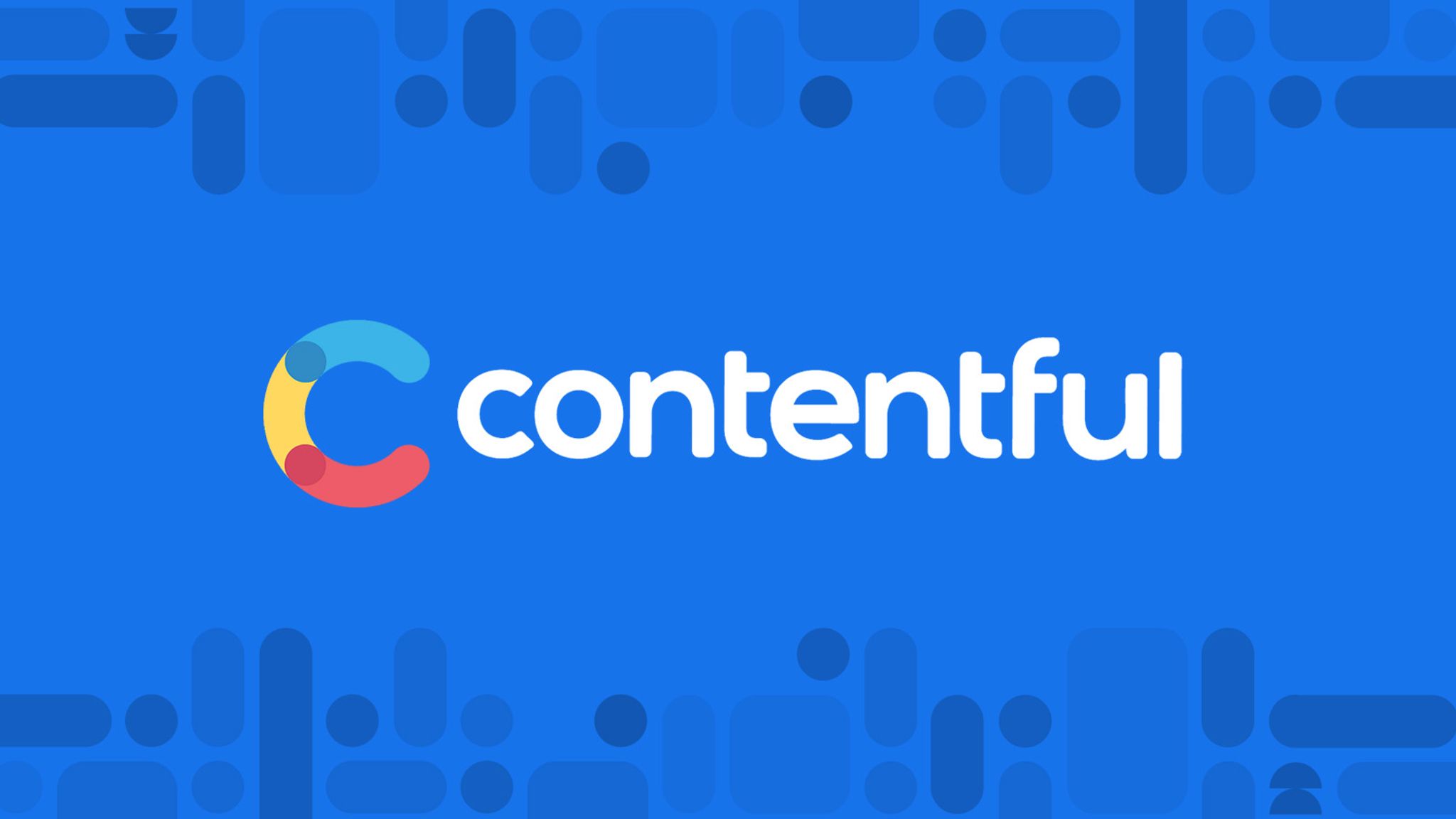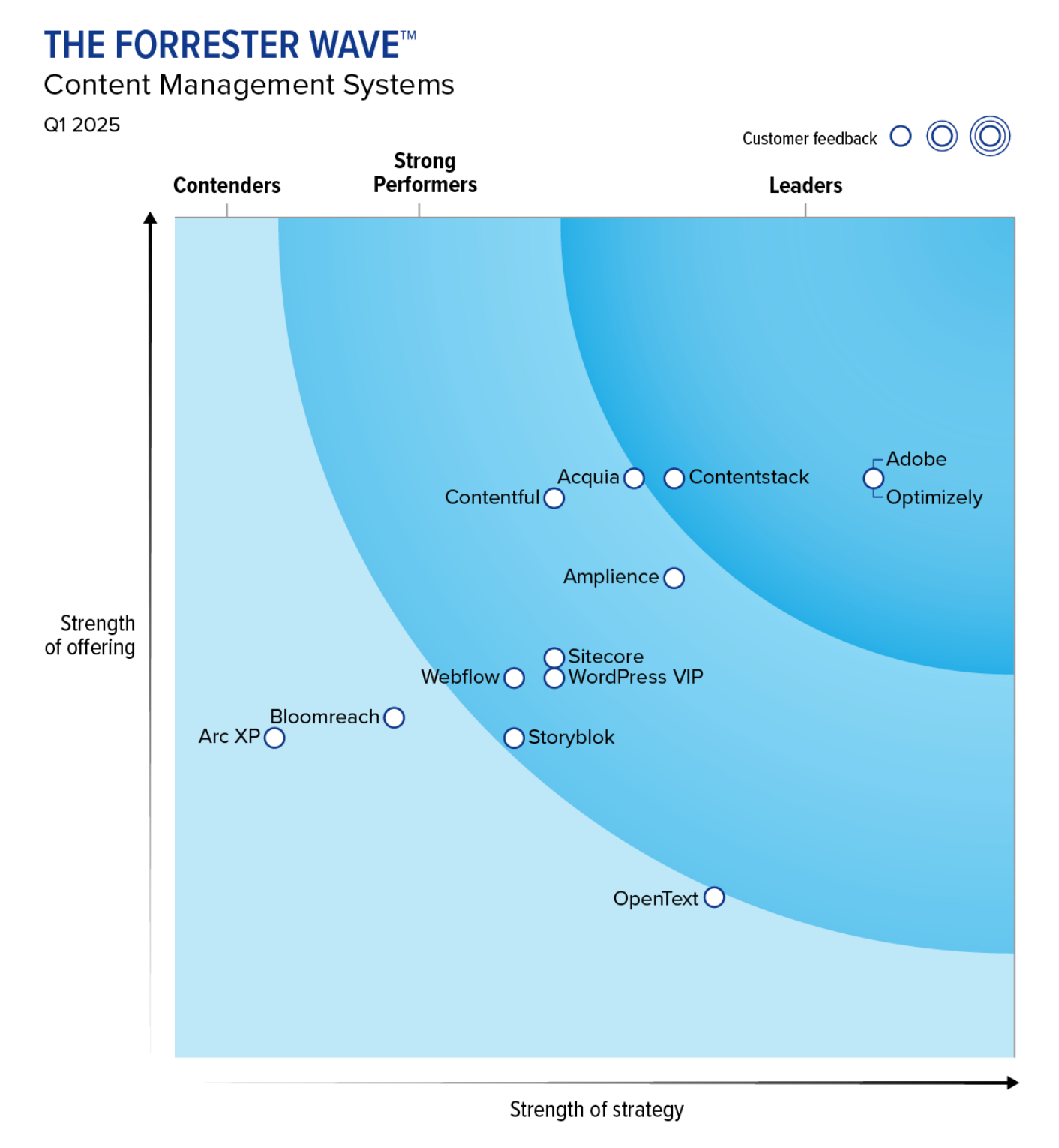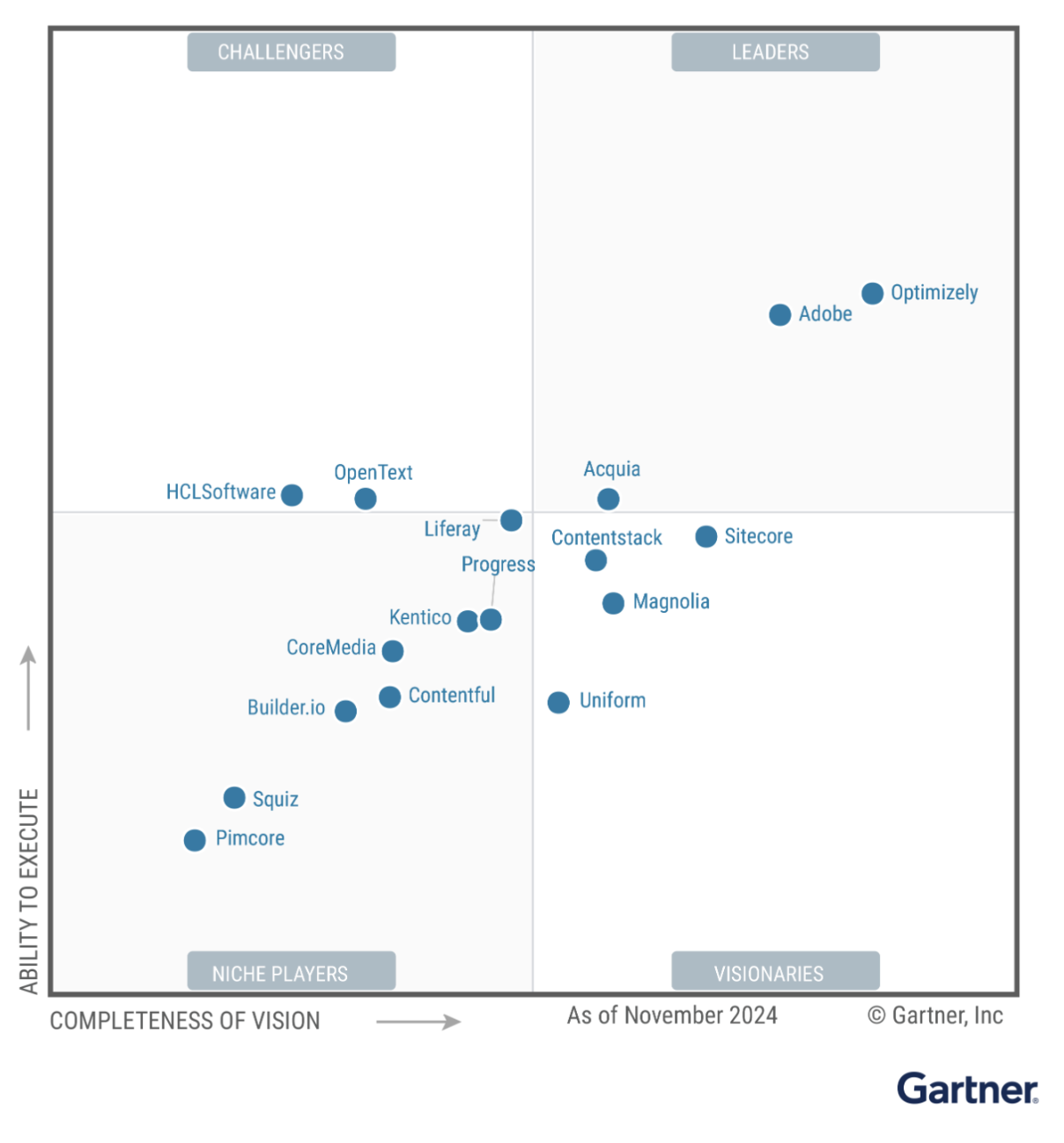Contentful Rolls Out New AI and Personalization Capabilities, Ramps Up R&D for its DXP

The composable digital experience platform is doubling down on innovation, introducing new AI and personalization features that extend its core CMS offering while bolstering its strategic partnerships with market leaders like Shopify.
In the battle for CMS and DXP supremacy, AI is on the front line – and that’s never been more apparent than in the latest crop of Forrester and Gartner analyst reports.
As you might expect, these research dossiers are dense jungles, and there’s a fair amount of data and narrative to weed through. But if you boil it down, it’s clear that the focus on AI and data is driving differentiated value for the field of players vying for the lucrative enterprise pie.
I’ve been talking to Contentful about its modern AI ambitions since 2023. That’s when the platform launched its innovative multi-experience orchestration, a new Experience Builder in its Contentful Studio, and a host of other AI-powered advancements – all focused on enhancing collaboration, speed, and scale for digital teams.
A lot has happened since then. Pioneering exploits in artificial intelligence and machine learning have ushered in a new age of agentic AI, and CMS and DXP platforms have been positioning beyond the early, low-hanging fruit of generative AI to embrace the potential of agents to do their bidding.
Of course, we’re still in the early days, and not every feature has paid off in spades. I’ve spoken to practitioners who describe some of these hyped-up AI features as a bit like playing pool with a rope. We can spend a lot of time analyzing the vendor dynamics and where the advantages and disadvantages lie, but it’s the channel and end customers that really tell the story.
In the composable realm, experimentation and futureproofing are key parts of the CX horizon. While legacy platforms are shifting to more modular profiles and adding features like headless CMS, platforms like Contentful have been rapidly building momentum – and might be better positioned with the core flexibility and adaptability to meet the next wave of AI-induced change.
To that end, Contentful is driving its vision forward with the introduction of some keen AI and personalization capabilities. Today, the company announced an array of new features and partnerships to deliver a modern, flexible solution for building digital experiences at scale.
According to Contentful, these new capabilities will deliver data-driven, AI-enabled personalization at the core of its composable DXP, which is designed to integrate with best-of-breed third-party tools. Together, these features will enable users and brands to centralize, personalize, deliver, and optimize digital experiences with greater speed, simplicity, and efficiency.
A big part of the secret sauce propelling Contentful’s new AI and personalization capabilities is its pioneering and market-proven composable CMS. Leveraging its headless roots, the platform is designed from the ground up to meet the needs of developers and technical users with augmented scalability, reliability, and flexibility.
At the same time, the aforementioned Contentful Studio – a low-code DX-building product for marketing teams – has enhanced content operations and streamlined workflows for complex global organizations. The company has also expanded its marketplace of connections, offering more than 100 integrations and plug-ins.
With composability baked into its DNA – and now, amped-up AI and personalization features – Contentful is posturing to take on the legacy landscape of DXP players with a more complete vision.
“Brands are frustrated by monolithic, bloated DXP solutions that aren’t fit for purpose,” said Contentful CEO Karthik Rau. “In this constantly evolving technology landscape, a flexible new approach is needed, and today marks the beginning of that change.”
Disrupting the DXP space with innovation
One of the key nuggets in Contentful’s announcement is its plan to double down on innovation and commit significant dollars to evolving its offerings. That might sound like a no-brainer, but at a time when M&A has been light and many companies are keeping the powder dry, Contentful might have the resources to fire up the engines.
A bit of context: Contentful has been riding the DX investment wave before and throughout the COVID years. Its most recent funding round of $175 million landed in July of 2021, bringing its valuation to roughly $3 billion at the time of close. Just one year earlier, it snapped up a robust $80 million – and that was a Series E. Go back and do the math, and it’s easy to peg them as well-capitalized.
Between growing competition and economic headwinds, there are numerous obstacles to navigate. But the opportunity is there: With a total addressable market expected to exceed $41 billion by 2032, the rapid growth of the DXP space underscores both the customer need and the overall marketplace demand.
To capture the wind in the right sails, Contentful has stated that it plans to increase its investment in R&D by more than 20% year-on-year. The goal is to accelerate innovation and set what it calls “a new bar for DXPs” – and what customers should expect from their platform.
Being on a DXP analyst grid is still a relatively new phenomenon for players like Contentful. But their foray into these categorical grids and infographics is a throat-clearing signal that the calculus has changed. This new breed of composable DXP is disrupting the established fabric and providing greater choice to enterprises as their stacks demand more flexible and adaptable solutions in an omnichannel world.
"Without question the DXP space is at the start of a significant evolution that will bring more clarity into the capabilities required to accelerate and differentiate experiences in modern digital marketing,” said Liz Miller, principal analyst at Constellation Research. “Contentful’s entry into DXP will shake up the market by challenging preconceived ideas that have limited innovation. The dedication to an API-first orthodoxy, a proven and flexible CMS platform, intentionally curated partner ecosystem, and investments in AI that will bring personalization and contextual digital experiences into view is just the start.”
AI-powered tools for marketers and developers
As part of its announcement, Contentful revealed some new AI capabilities under the hood aimed at marketers and developers. These features bring novel approaches for applying AI to specific workflows and key points in the content ecosystem – and are available today.
The first is called AI Actions, a framework for powering content operations with greater control over AI. In a nutshell, it enables marketers to embed generative models at any stage of the content pipeline – from creation to adaptation to publishing – giving teams and brands more direct agency over their AI strategy.
AI Actions answers the urgent need for marketing teams to deliver high-impact experiences amidst the sometimes clumsy and often complex ecosystem of content. It allows them to produce content faster and more accurately by erecting the essential guardrails around business and brand guidelines.
Along with those structures, AI Action’s automated workflows can help accelerate the core review and approval processes, helping to maintain efficiency and consistency at scale. Because it’s embedded within the Contentful platform, AI Actions also reduces the friction of repetitive marketing tasks like translations and localization for global audiences, one-click SEO, and alt-text generation.
Contentful has also deployed an AI Actions marketplace with ready-made templates to help teams get started quickly. This includes an inaugural contribution from AKQA, a Contentful Gold Partner.
Another new addition is the Granular Roles and Permissions within Contentful's Taxonomy capabilities. Similar to governance-geared CMS permissions, these are designed to help businesses maintain tighter control over their content creation and usage (which can get out of hand quickly). It also aligns with enterprise requirements for robust security and compliance – including SOC 2 Type 1 certification – so brands can deliver consistent and reliable digital experiences.
Adding personalization that performs
Personalization has long been a central topic in the CMS and DXP spaces. Since the advent of GenAI, vendors have been counting on AI to unlock the promise of scalable content variants and other capabilities, allowing brands to finally realize the true potential of their personalization investment.
Along with the challenges of arming personalized experiences with ample “content fuel” to test and optimize, the complexity of UX (i.e., jumping through the proverbial “hoops of fire”) has often been an inhibitor. Some DXPs require users to juggle multiple tools and tabs, making an already challenging process more cumbersome.
Contentful is endeavoring to overcome these layers of friction, providing a personalization toolbox that’s purpose-built for marketers and within easy reach. Contentful Personalization will live directly within its web app, allowing users to quickly find and manage all their audiences, experiments, and personalized experiences in one unified workspace.
Having everything centralized in a single “command center” will help to streamline personalization, making it faster and more efficient for marketing teams to optimize customer experiences.
One of the handy features baked into Contentful Personalization is its AI Suggestions. Designed to take the guesswork out of personalization and experimentation, it includes a range of resources like Experience and Audience Suggestions – all designed to help maintain consistency and efficiency.
Contentful’s AI Variant Generation does the heavy lifting. Based on your core content, you can instantly craft personalized, on-brand variants that align with your target audience strategy and brand guidelines.
Another great feature: Contentful Personalization can activate customer data for personalized experiences and deeper engagement through its Customer Data Connectors. By integrating with leading platforms like Shopify, Klaviyo, and SAP Emarsys, marketers and brands can enhance and optimize their overall performance.
Investing in strategic partnerships (like Shopify)
As a MACH-certified ISV, Contentful’s API-first architecture allows it to play well with best-of-breed technologies – allowing users to extend core CMS or DXP capabilities to meet the demands of various use case.
Along with today’s AI and personalization news, Contentful also announced a strategic partnership with Shopify, which is underscored by the aforementioned Shopify Connector. The combo will enable brands to connect and synchronize content and commerce systems between the two platforms.
For brands, this can translate into more compelling, data-driven shopping experiences at scale. It can also pay off in accelerated time to market and the delivery of a better overall CX.
Contentful’s Shopify data connector will also be joined by a corresponding app in the Shopify Liquid Storefront that enables AI-driven personalization within the Shopify ecosystem, enhancing product and content synchronization and giving users more storefront design flexibility.
“This collaboration underscores the benefit of Contentful’s agile DXP approach," said Dale Traxler, Director of Technology Partnerships at Shopify. “Our joint customers can connect, manage, and optimize all touchpoints of the consumer journey from both the Contentful and Shopify environments, simplifying workflows and accelerating conversion.”
Why it matters
Contentful continues to drive strong performance in the CMS landscape, as reflected in the recent Forrester Wave for Content Management Systems. That performance is underscored by its pioneering heritage in headless, its composable orientation, and strong enterprise adoption.
Also, Contentful Studio stitched the gap for headless users, enabling teams to visually build, personalize, and scale content across every channel without being hampered by dev support. Compared to other downstream pure-play headless platforms, Studio’s suite provides robust tooling that goes beyond visual editing.

Source: Forrester
Last year, the company acquired Ninetailed – a composable personalization and experimentation solution – which juiced its ability to create, test, and analyze personalized experiences. This move (among others) has further bolstered its shift to a DXP track.
While Contentful’s emergence in the DXP game qualifies as disruptive, it’s still facing headwinds from a field of competitors with maturing AI-powered personalization. While currently a Niche player on the Gartner 2025 Magic Quadrant for Digital Experience Platforms, the company’s stated goal of increasing its R&D investment by more than 20% year-on-year is a sage move – if not a necessary one.

Source: Gartner
The composable phenomenon (if there’s a better word, let me know, but I’m not using revolution) has created a whirlwind on all sides of the DX aisle. We’re no longer in a race to the middle, we’re in a race to differentiate value – and high-utility AI is going to be a key to winning. As agent-based strategies take shape, the platforms with a solid agentic strategy will be best equipped to compete.
One of the many advantages of a composable architecture is the ability to futureproof around the unknown. Of course, futureproof doesn’t mean foolproof, but it can hedge your bets – and in many cases, provide a more stable foundation for experimenting. This is where Contentful has an advantage in the stack.
“We are looking at a future where brands must deliver more compelling experiences across all channels,” said Rau. “By adopting the right technology now, brands can confidently prepare for a highly personalized, autonomous, and data-driven future. We are on a mission to help our customers succeed in this new reality.”
If you’re in the evaluation pipeline for a CMS or DXP, Contentful is definitely cut more to the enterprise cloth. However, it does provide a well-rounded set of tools and resources for the individual practitioner, be it a marketer or developer. As a MACH-certified platform, it also provides a solid API-first posture designed for composable architectures.
With a clean, easy-to-use UI and well-organized documentation, it’s easy to see why Contentful has earned its position across the grids. The addition of these new features could be a game changer for the platform, and if AI-powered personalization is on your list, you might want to give these tools a test drive.
Looking for guidance on Contentful? Talk to an expert.
Upcoming Events

The Composable Conference 2025
April 22-24 – Chicago, USA
Experience the future of composable and MACH principles in “The Windy City” and dive even deeper into the innovative world of MACH architecture and its benefits for your business. Building on the momentum of MACH THREE, this conference will provide your teams with the expert, impartial guidance needed to craft a winning transformation strategy and leverage the latest advancements in automation and Al to maximize efficiency and drive your organization forward. This event is ideal for executives, business leaders, technologists, and everyone in between who is looking to harness the power of composable. Secure your spot today.

CMS Summit 25
May 13-14, 2025 – Frankfurt, Germany
Don't miss the first European edition of our prestigious international conference dedicated to the global content management community! CMS Summit 25 will bring together top-notch speakers, our renowned learning format, and engaging social events. Hear from leading practitioners like Deutsche Bahn, Dr. Oetker, and more – and join customers, agencies, and CMS vendors as we discuss current trends and what's ahead for the content and digital experience fields. Connect and network at the only vendor-neutral, in-person conference focused on CMS. Space is limited for this exclusive event, so book your seats today.

CMS Connect 25
August 5-6, 2025 – Montreal, Canada
We are delighted to present the second annual summer edition of our signature global conference dedicated to the content management community! CMS Connect will be held again in beautiful Montreal, Canada, and feature a unique blend of masterclasses, insightful talks, interactive discussions, impactful learning sessions, and authentic networking opportunities. Join vendors, agencies, and customers from across our industry as we engage and collaborate around the future of content management – and hear from the top thought leaders at the only vendor-neutral, in-person conference exclusively focused on CMS. Space is limited for this event, so book your seats today.
